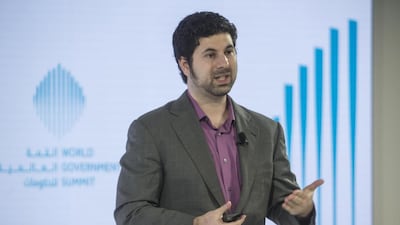DUBAI // Education systems across the globe need an overhaul because they are out of sync with the aspirations of newer generations.
That was the view of Dr Scott Kaufman, scientific director of the Philadelphia-based Imagination Institute, at a World Government Summit session on Sunday called Can Our Education System Destroy the Talent?
He said that most systems used antiquated ways to test and grade intelligence and aptitude.
“Scoring systems do not adopt a broader view of intelligence, creativity and imagination – three commodities desperately needed in today’s world of extraordinary innovation that have got lost in the process,” Dr Kaufman said on the first day of the fifth summit, at Madinat Jumeirah.
“More than curriculum, it is important to ask students questions about their dreams, passions and how they imagine themselves to be when they grow up, as catalysers for achievement.”
He believes that while intelligence matters, the way we measure it is outdated and that there needs to be a better correlation between IQ and academic achievement.
He also emphasised the importance of “beyonder characteristics” as the actual measure of lifelong achievement.
“Love of work, persistence, purpose in life, deep thinking, tolerance to mistakes, open to change, risk-taking, feeling comfortable as being the ‘minority of one’ are individual characteristics that motivate students to fuel their personal ambitions,” Dr Kaufman said.
“These characteristics are a better predictor of achievement than IQ, and kids who have them ingrained in them since childhood are likely to be overall achievers.
“People who are open to experience, who reflect and play with ideas, are curious souls with an active imagination and believe in their personal growth are more likely to find a personal reason to contribute to the society.
“Magic strikes when these dreamer traits meet the doer -determination – making the blend of imagination and dreams the most important instrument for lifelong creativity.”
He also said that schools had a duty to increase young people’s engagement if they wanted to get the best out of them.
“I think we’ve done a really good job at measuring the small ‘i’ intelligence, which includes things, such as attention, concentration, memory, numeracy and literacy,” he said. “The big ‘I’ intelligence does encompass the small ‘i’ but goes way beyond that.
“Intelligence is the dynamic interplay of engagement and ability in pursuit of personal goals.”
Dr Kaufman said he would like to see an education system where everything is revisable.
“Everything is personalised, in the sense that you are able in your freshman year to create a portfolio of what you have learnt and what you’re most proud of,” he said.
“When applying to college, instead of something like the SATs, let the students decide what they want to showcase.”
Hind Al Mualla, chief of creativity, happiness and innovation at the Knowledge and Human Development Authority (KHDA), Dubai’s education regulator, said the authority believed imagination and engagement were vital to pupils’ success and learning. “We believe those are key factors to be taken into consideration in education,” she said, adding that KHDA had several projects that focused on more than just academic achievement.
“The Project Lighthouse initiative, for example, focuses on these standards, such as imagination, resilience, tolerance and empathy.
“Principals of 100 schools present their findings, after which educators share practices and come up with projects to implement in Dubai schools.
“We always try to connect with research and think tanks about positive education and how to bring it into daily practice.”
Hanan Al Hroub, the winner of last year’s Varkey Foundation’s Global Teacher Prize, said educators should use more fun means to teach their pupils.
“The point is to reach the student and make sure he or she learns,” said Ms Al Hroub, who developed a play-and-learn technique to help traumatised Palestinian primary schoolchildren.
“Through play, you are not only making learning fun, but also decreasing the level of frustration that some children may possess from their surroundings.”
She said that the case of one boy, nicknamed “the little criminal”, reaffirmed her belief in the technique. “I was shocked because a nickname like that will affect him,” she said.
“From more than six incidents of trouble a day, it decreased eventually to nothing because of the play and the healthy competition.”
dmoukhallati@thenational.ae

